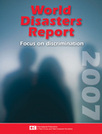Sort by: Author | Title | Publication Year
BOOKS
The Failure of Democracy in the Republic of CongoJohn F. Clark Why did the democratic experiment launched in the Republic of Congo in 1991 fail so dramatically in 1997? Why has it not been seriously resumed since then? In tackling these complex questions, John Clark provides a thorough analysis of more than fifteen years of Congolese politics.
Clark explores a series of logical hypotheses regarding why democracy failed to take root in Congo, moving from More > |  |
Racial Divide: Racial and Ethnic Bias in the Criminal Justice SystemMichael J. Lynch, E. Britt Patterson, and Kristina K. Childs, editors How is the racial divide in US society reflected in the practices of the nation's criminal justice system? Documenting a persistent pattern of institutionalized racial and ethnic discrimination at every stage of the system, the authors focus on issues of policing, the adult and juvenile court systems, prisons, the application of the death penalty, the science of forensics, and the incidence of More > |  |
Asia's New RegionalismEllen L. Frost As the political drive to establish closer ties among Asian governments continues to gain momentum, there has been much debate about the realities of Asian regionalism. Does the community-building activity in fact signal the birth of "Asia Major"? What are the obstacles to integration? And is integration a positive trend for the region and for external actors? Sifting rhetoric from More > |  |
Perspectives on Identity TheftMegan M. McNally and Graeme R. Newman, editors Presenting new research on the crime of identity theft, the authors of this volume focus on situational measures to protect sensitive personal information.
More > |  |
Power and Succession in Arab Monarchies: A Reference GuideJoseph A. Kéchichian Power and Succession in Arab Monarchies provides an essential compendium of information regarding the politically charged issue of succession in Bahrain, Jordan, Kuwait, Morocco, Oman, Qatar, Saudi Arabia, and the United Arab Emirates.
Based on scarce source material and a wide range of inside information, this exhaustive reference:
traces the rise of each ruling family
outlines key More > |  |
CIVICUS Global Survey of the State of Civil Society, Volume 2: Comparative PerspectivesV. Finn Heinrich and Lorenzo Fioramonti, editors Volume 2 of the CIVICUS Global Survey of the State of Civil Society offers a wide-ranging analysis of key issues facing civil society worldwide. The authors draw on information collected by the CIVICUS Civil Society Index project in more than 45 countries to explore issues such as civil society’s accountability, its relations to the state and corporate sector, and its role in governance and More > |  |
World Disasters Report 2007: Focus on DiscriminationInternational Federation of Red Cross and Red Crescent Societies Gender, race, religion, age—there are so many reasons why people are excluded from society. Those who are face an uphill struggle for equality, even if they have the strength and wherewithal to take the first steps. However many do not. What, then, is the reality for these groups when disaster strikes?
Hidden, ignored, or simply invisible, the most vulnerable—and those potentially More > |  |
Surrogates of the State: NGOs, Development and Ujamaa in TanzaniaMichael Jennings In Surrogates of the State Jennings explores the delicate relationship between development NGOs and the states they work in using his exhaustive and illuminating case study of Tanzania in the 1960s and 70s. During that time Tanzania instituted the rural socialist Ujamaa program, resulting in the forced resettlement of 6 million people to villages, transforming the map of the country. Rather More > |  |
Mobilizing for Human Rights in Latin AmericaEdward Cleary In this follow-up to his widely read The Struggle for Human Rights in Latin America, Edward Cleary examines some of the robust human rights movements of the past two decades.
More > |  |
Dissent from WarRobert Ivie The rhetorical presumption of war's necessity, observes Robert Ivie, functions to shame anyone who opposes military action and to portray dissenters as threats to national security. Showing the danger in this, Ivie explores the language of war supporters, soldiers, and antiwar activists and proposes strategies for resisting the dehumanizing language of war propaganda. His aim throughout is to More > |  |



